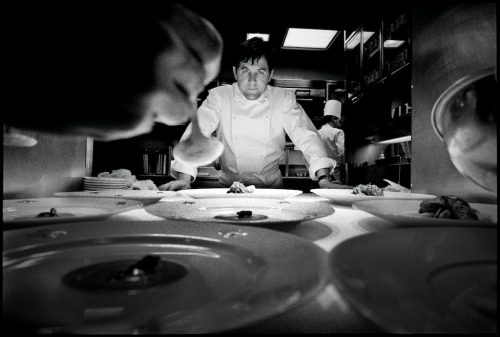
BY JUDY CARMACK BROSS
“When the restaurant closed, Charlie closed.”—Chef Grant Achatz on the late Charlie Trotter
Love, Charlie: The Rise and Fall of Chef Charlie Trotter, written and directed by Rebecca Halpern, premiered last month at the 57th Chicago International Film Festival (CIFF), with family members, legendary chefs, and diners in attendance, remembering the immense impact of this legendary chef, who along with figures like Michael Jordan and Oprah Winfrey put Chicago on the map in the 1990s.

Charlie Trotter. Photo by Paul Elledge.
The documentary captures the ways Trotter revolutionized his industry and achieved worldwide fame: the 10-course tasting menu, the cookbooks with photos so lush they were called “food porn,” the exquisite vegetables sourced from an Ohio farm, the chef’s table in his pristine kitchen, the up-and-coming culinary stars he inspired (who soon would be nipping at his heels), an experimental cooking video that was of the first of its kind, the international interviews.

Chef Norman Van Aken and Naha’s Chef Carrie Nahabedian at the Love, Charlie world premiere. Photo by Lynn Renee Photography.

Chef Della Gossett, former pastry chef at Charlie Trotter’s and current Spago Pastry Executive Chef in Los Angeles; Farmer Lee Jones. the supplier of Charlie Trotter’s microgreens; and Michelle Gayer, former executive pastry chef at Charlie Trotters and currently a pastry chef in Minneapolis. Photo by Lynn Renee Photography.
The daughter of Madeline Halpern, a Today’s Chicago Woman and Pioneer Press food writer who once described Trotter as a “magical unicorn,” Rebecca Halpern grew up in Winnetka, just a suburb away from the renowned chef. Delights of this directorial debut are the home movies, intimate interviews with family and New Trier High School classmates, including his first wife, Lisa Ehrlich, all of whom called him Chuck.

Tom Trotter, Charlie’s brother; mother Dona-Lee Trotter; and sister Anne Trotter Hinkamp. Photo by Lynn Renee Photography.
Home videos show a fresh-faced little boy who loved to do flips off diving boards. At University of Wisconsin, he is remembered driving around campus in his sports car, blaring Ayn Rand tapes. Against a backdrop of the hundreds of postcards and letters he sent her when he was getting started, Ehrlich speaks with both tenderness and passion for the early Chuck Trotter, the best friend who became her husband.

Larry Stone, Master Sommelier, and Lisa Ehrlich, Trotter’s first wife. Photo by Lynn Renee Photography.
Halpern, who is currently working on the documentary’s national distribution, shares, “The thesis of the film is that when someone’s identity fades away, they fade too. It is a cautionary tale, not a tragedy, not an inspiring piece. It shows what happened to this Wilmette boy who exploded onto the scene. He opened in a brownstone in August 1987 and right away it was booked solid for the next six months. What happened in that Lincoln Park restaurant until its closing in 2012, and how he was consumed in the end by his passion, is only part of our story. I really wanted to humanize him. In the end he had tremendous health issues and he couldn’t keep up with the times. I wanted to cement his legacy.”
Halpern was hired by Renee Frigo, founder of Oak Street Pictures, to do the documentary. She was the co-founder of Lucini Italia olive oil, which Charlie championed, and she wanted to do an homage to him. “At the time I had never met him, eaten at his restaurant, and only had his takeout food one time,” she says.

Director Rebecca Halpern.
Effective unifying features throughout the documentary are shots of just shoes going up the steps of the restaurant. First, the running shoes—Trotter ran daily for years in Lincoln Park close to his home—then heavy shoes for chefs, then nondescript, all the time footfalls getting more labored. Halpern believes that Trotter suffered several mini-strokes that he kept a secret before his death in 2013 of a stroke at age of 54.
“He didn’t care about being happy, he wanted to pursue excellence on every level. It was a process not an outcome,” she says. “He had his employees cleaning the inside of the dumpster every night. He was totally consumed and at one point was sleeping on the floor of the dining room. Getting everything just right became the most important thing.”

Chef Guillermo Tellez, Chef Bill Kim, Chef Giuseppe Tentori aka “Charlie’s Angels,” all of whom used to work for Trotter.
The film opens with Trotter saying that if it weren’t for the employees and the customers the restaurant business would be the best in the world: “Basically, I hate people,” he says as he prepares for a TV interview. “By today’s standards his conduct with his staff would be considered abusive. He did inspire a whole generation of chefs, now in their forties and fifties,” Halpern explains. “It is sad to realize that the newest generation of chefs often have no idea who Charlie Trotter was.”
Trotter’s first jobs were at the Ground Round in Wilmette and at the Monastery in Madison where he wore the requisite monk’s robe. The popular entrepreneur Gordon Sinclair hired him as a busboy for his local restaurant and soon took off to work in Sinclair’s Jupiter location.

Here’s Charlie’s kitchen in San Francisco when/where he had a brief, six-week stint at the California Culinary Academy. While in San Francisco, Trotter also worked at Cafe Bedford, Le Méridien, and Campton Place Restaurant (now Taj Campton Place Hotel) under Bradley Ogden. Photo courtesy of Anne Trotter Hinkamp.

A photo of young Chuck, inscribed on the back to his then-best friend and later first wife, Lisa Ehrlich, during his time in San Francisco (1983-1984). Photo courtesy of Lisa Ehrlich.
Trotter and Erhlich headed to California to meet Alice Waters in her kitchen at Chez Panesse. In the film she, along with other chefs, including Achatz, Emeril Lagasse, and Wolfgang Puck, speak of his brilliance. She says to Puck, “He was the first American kid to open a great restaurant, to be a fearless pioneer.”
His first hire, Reginald Watkins, a saucier from New Orleans who worked with him for 24 years, shared insightful recollections with Halpern for the film before he died in 2020: “The cooks had to re-invent every night. It was energy mixed with extreme panic. The atmosphere could be very cutthroat. We were all fighting over pots and pans.”
Trotter did his homework, not only visiting American chefs but touring Europe, particularly France and Switzerland, as well. “He drew red lines all over maps of Europe. It was like a General Patton plotting battle attacks,” Ehrlich remembers in the film. “It was Girardet in Switzerland that fit his vision of cuisine, wines, service, and table settings.”
Trotter eventually returned to Chicago, where in 1987 he told his recently retired businessman father, Bob Trotter, he was ready to open his own restaurant. With Bob as the financial backer and his mother, who would first help out in the cloakroom, Chuck opened Charlie Trotter’s (he thought “Chuck Trotter’s” sounded too much like a steakhouse). His parents previously rejected his name choice of “Zelda’s,” after F. Scott Fitzgerald’s troubled wife.
“Opening the restaurant was in part to make his father proud,” Ehrlich comments in the film. “Sadly, I think he came to the realization that some people have great marriages and some have great restaurants. He chose having a great restaurant. And our marriage ended.” But they always kept in touch.
Halpern took six months to do background research and wrapped the film in April of this year. She says, “Every day my work was my bliss. These were 20 hours a day without a day off. On the first day, everything closed because of COVID. It probably took a third longer to made and cost a third more money to produce because of the pandemic. The interviewing was me on an iPad and the cameraman.”

Brooks Yang, Associate Producer; Renee Frigo, Producer; Rebecca Halpern, Director; and Holly Meehl, Co-Producer. Photo by Lynn Renee Photography.

Shaun Harris and Ray Harris, Executive Producer of Love, Charlie. Photo by Lynn Renee Photography.

Sold-out audience at the Love, Charlie world premiere at CIFF. Photo by Lynn Renee Photography.
The final credits detail Trotter’s far-reaching philanthropy: the many scholarships he underwrote for promising chefs, the cooking classes for more than 30,000 inner-city children, the numbers of young people he invited into the restaurant to eat and learn about good food and good manners. Halpern captures Trotter in all his captivating capacity.
Despite the arduous schedule, Halpern continued to play a leadership role on the board at FACETS, the non-profit that connects adults and children to transformative film experiences: “I want to teach children the power of storytelling through documentary filmmaking. FACETS is a hometown organization that opens the world to underserved children and those in the Chicago Public Schools through its classes, Film Festival, and website. There is nothing more valuable. I am proud of the legacy of our founder, Milos Stehlik, and blown away by what Karen Cardarelli, our executive director, has accomplished.”

Karen Cardarelli and Rebecca Halpern. Photo by Lynn Renee Photography.

CIFF Senior Programmer Anthony Kaufman and Halpern at the post-screening Q and A. Photo by Lynn Renee Photography.
Halpern lives in Los Angeles now but wants to be a bridge between Chicago and Hollywood and open doors for FACETS to the documentary film community out there: “I want to have a satellite community for this thriving organization,” she says.
“Rebecca has shown her dedication to supporting independent filmmakers in many ways: one of which is by sitting on the FACETS Board of Directors for nearly 10 years. Her passion for excellence in film has been a critical catalyst for us,” Cardarelli shares. “We were exhilarated to be a fly on the wall while she worked on the LOVE, CHARLIE project. It’s extraordinary to watch from afar as a film develops, questions, reaches, pushes, and finds its shape. We had the privilege of watching Rebecca’s process through this project.”
“Rebecca and this film and the work of CIFF embolden all that FACETS is proud to support: independent voices and independent stories,” she adds. “We can’t wait to see what’s next from our favorite storyteller and board member.”
For more information about FACETS and its 38th annual Chicago International Children’s Film Festival on now through November 14, visit facets.org.













